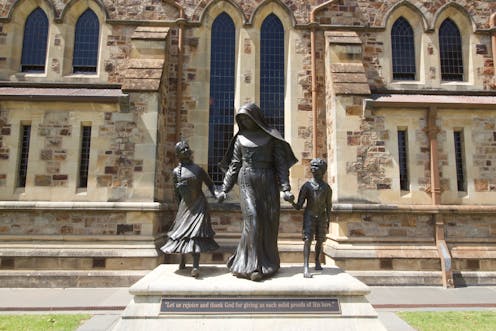Australians reject discrimination that is based on religious belief: new research
- Written by Kate Gleeson, Associate Professor of Law, Macquarie University

Since the change of government at the May federal election, the fate of the contentious religious discrimination legislation[1] remains unclear.
There is bipartisan consensus[2] that Commonwealth legislation should protect individuals of different faiths from discrimination in the workplace and elsewhere.
But Prime Minister Anthony Albanese has not committed to a timeline to enact any new legislation. His government has also stepped away from controversial areas of this policy promoted under the Morrison government that focused on “religious freedoms”.
The new government may be closer to the public mood.
Read more: A ‘Christian nation’ no longer: why Australia’s religious right loses policy battles even when it wins elections[3]
Results of the 2022 Australian Cooperative Election Study (ACES) confirm that voters do not see religious discrimination a significant issue. Only a minority (27%) agree that “Australians who hold religious beliefs face a lot of discrimination”. A majority either disagree (31%) or are neutral (42%). Clear majorities oppose protections of religious freedom seen as discriminating against LGBTIQ+ individuals.
Much of this controversy has centred on schools. Since the advent of anti-discrimination laws in the mid-1970s[4], religious schools have benefited from exemptions[5] allowing them to refuse to employ staff or accept students based on their sexuality or gender identity — if this is contrary to the ethos of the school.
Despite these exemptions, campaigns to strengthen “religious freedoms[6]” intensified following marriage equality legislation[7] in 2017. The debate was further inflamed by the sacking of rugby player Israel Folau[8] for posting social media comments about gay people and others, in line with his Christian faith, in 2019.
Read more: How might an apology feature in the new religious freedom bill?[9]
In response, the then prime minister, Scott Morrison, drafted “religious freedoms” bills in 2019[10] and 2021[11]. The latter was based on an election promise to override state and territory laws to protect “statements of belief” made by individuals “in accordance with doctrines, tenets, beliefs or teachings of their religion”.
The bill was dramatically shelved[12] in February 2022. Five moderate Liberal MPs crossed the floor in the House of Representatives. They objected to the bill’s protections for potentially anti-LGBTIQ+ commentary without any accompanying commitment to protect transgender children from exclusion from schools. The bill was doomed to fail in the Senate.
The conservative Australian Christian Lobby[13] in turn targeted[14] moderate Liberals in the election campaign, portraying them as opponents of religious protection.
Our new data reinforce[15] the extent of voter resistance to aspects of the “religious freedoms” agenda in the lead-up to the election.
The ACES asked voters a series of questions about religious schools and conditions for staff and students. A clear majority (67%) disagreed that “religious schools should be able to refuse to employ staff based on their sexual orientation”. Only 15% agreed.
Almost identical results were reported for the statement about refusing to “employ staff because of their transgender identity” (65% disagreed and 16% agreed). Voters also disagreed by very similar margins that religious schools should be able to “exclude students based on their sexual orientation” or “their transgender identity”.
There were predictable demographic differences for all four statements. Women consistently expressed disagreement in the 74% to 79% range. Men also disagreed, but with smaller majorities (56% to 59% range). Younger voters were most inclined to express disagreement, while the majority of voters aged 65 and over also registered disagreement.
These findings suggest Morrison misjudged[16] the electoral mood. He defended[17] the Liberal candidate for Warringah, Katherine Deves, whose views on sports and transgender identity generated backlash against the Coalition.
If the Coalition was looking to win conservatives in outer-metro electorates, its efforts did not succeed on election night.
Indeed, 39% of respondents to the ACES agreed that “Australian politics is too focused on the rights of religious people”. Only 21% disagreed with the statement, and 40% expressed a neutral view.
US-style religious politics appear to have limited appeal in a country with a growing distance from organised religion. Last month’s Census results showed[18] 39% of Australians do not identify as religious.
Responding to a similar question in ACES, 49% identified as non-religious. At the same time, Australians appear on board with sexual and gender diversity. They reject protections for religious organisations to exclude people from employment and schooling on these bases.
No doubt the Albanese government will be weighing this reality as it considers its next steps in addressing religious discrimination in law.
Survey note: The Australian Cooperative Election Survey (ACES) is a collaborative project involving Australian universities that used YouGov panel data and methodologies to study the 2022 federal election. The survey was fielded online in May 2022 with an overall sample of 5,988 voters and 1,044 voters for the religion module. Data were weighted to reflect the population and the methodology is detailed here[19].
References
- ^ contentious religious discrimination legislation (theconversation.com)
- ^ bipartisan consensus (www.smh.com.au)
- ^ A ‘Christian nation’ no longer: why Australia’s religious right loses policy battles even when it wins elections (theconversation.com)
- ^ in the mid-1970s (www.equalopportunity.sa.gov.au)
- ^ exemptions (classic.austlii.edu.au)
- ^ religious freedoms (theconversation.com)
- ^ marriage equality legislation (www.legislation.gov.au)
- ^ sacking of rugby player Israel Folau (www.theguardian.com)
- ^ How might an apology feature in the new religious freedom bill? (theconversation.com)
- ^ 2019 (www.ag.gov.au)
- ^ 2021 (parlinfo.aph.gov.au)
- ^ dramatically shelved (www.afr.com)
- ^ Australian Christian Lobby (theconversation.com)
- ^ targeted (www.theguardian.com)
- ^ reinforce (theconversation.com)
- ^ misjudged (www.crikey.com.au)
- ^ defended (www.abc.net.au)
- ^ showed (www.smh.com.au)
- ^ here (commercial.yougov.com)
















